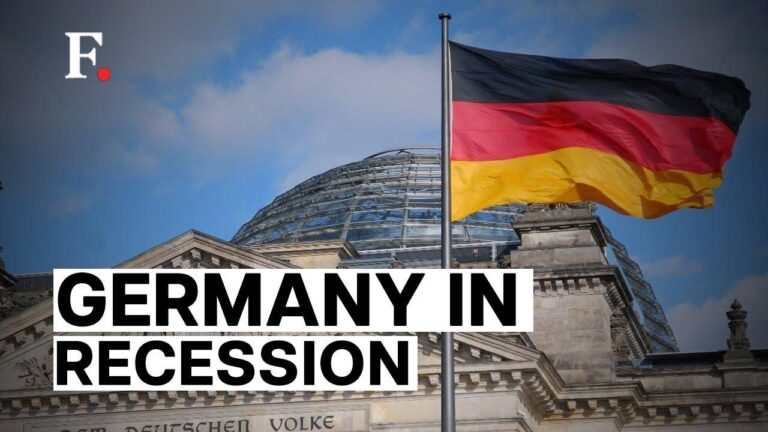Germany’s economy has slipped back into recession, surprising many analysts and investors amid broader signs of global economic slowdown. Yet, in a striking divergence, the nation’s benchmark DAX index has defied this negative momentum, showing resilience even as key economic indicators point toward contraction. This unexpected disconnect between Germany’s economic performance and its stock market raises questions about investor sentiment, underlying market dynamics, and what lies ahead for Europe’s largest economy.
Germany Faces Economic Contraction Amid Global Uncertainties
Germany’s economy has taken a noticeable hit as several key indicators point toward a downturn fueled by persistent global challenges. Supply chain disruptions, geopolitical tensions, and inflationary pressures have collectively weighed heavily on industrial output and consumer spending. Despite being Europe’s largest economy, recent data reveal that GDP contracted for the second consecutive quarter, officially marking a recession. Sectors such as manufacturing and exports have been particularly hard hit, with order books thinning and investment confidence waning amid uncertain international trade dynamics.
Yet, in contrast to the broader economic malaise, the DAX index has displayed unexpected resilience. Several blue-chip companies within the DAX have continued to post solid earnings, buoyed by robust demand in certain niches and strategic pivots toward sustainability and digital innovation. Key factors underlying this divergence include:
- Strong corporate earnings from automotive and tech sectors
- Increased export demand in emerging markets despite global headwinds
- Government stimulus measures aimed at stabilizing critical industries
| Sector | Q1 Growth | Q2 Growth |
|---|---|---|
| Automotive | -2.1% | -4.3% |
| Technology | 1.7% | 0.9% |
| Exports | -1.5% | -3.8% |
| Consumer Spending | -0.8% | -2.2% |
DAX Index Shows Resilience Despite Recessionary Pressures
While Germany’s economy has officially slid back into recession, the DAX index has showcased remarkable resilience, bucking the downward trend seen in broader economic indicators. This divergence highlights investor confidence in key sectors such as technology, healthcare, and renewable energy, which have continued to post solid earnings despite headwinds. Experts attribute this stability to a combination of strong corporate earnings, strategic government stimulus measures, and a shift toward innovation-driven industries.
Market analysts have pointed to several factors supporting the DAX’s performance:
- Robust Export Demand: Sustained demand from Asia and the US has kept manufacturing firms afloat.
- Sector Diversity: The index benefits from a broad mix of industries, cushioning impact from any single underperformer.
- Investor Optimism: Renewed confidence in long-term growth sectors like green technologies.
| Sector | Performance Q1-Q2 | Impact on DAX |
|---|---|---|
| Technology | +8.2% | Strong driver |
| Automotive | -3.5% | Moderate drag |
| Healthcare | +5.1% | Stable growth |
| Renewables | +10.4% | Major contributor |
Strategic Steps for Investors Navigating Germany’s Diverging Market Trends
Investors are facing a complex landscape as Germany’s broader economy contracts while the DAX index stubbornly climbs. This divergence signals that market sentiment is being driven by selective sectors rather than a uniform economic recovery. To capitalize on this, savvy investors should focus on sector-specific opportunities: technology firms benefiting from digital transformation, defensive stocks in consumer staples, and export-oriented companies less impacted by domestic demand. A diversified approach, balancing growth pockets with recession-resilient assets, can mitigate risks amid macroeconomic uncertainty.
- Target innovation leaders: Companies accelerating automation and renewable energy adoption.
- Monitor supply chain trends: Firms with strong global networks often outperform during localized downturns.
- Emphasize dividend stability: Blue-chip stocks offering reliable income provide a buffer against volatility.
| Sector | Performance Trend | Key Investor Focus |
|---|---|---|
| Technology | Outperforming | Innovation & Digital Services |
| Consumer Staples | Stable | Dividend Reliability |
| Manufacturing | Under Pressure | Export Resilience |
Flexibility remains paramount as geopolitical and policy dynamics reshape market conditions rapidly. Investors should maintain a vigilant watch on inflation data, ECB interest rate moves, and corporate earnings reports to adjust allocations promptly. Embracing agility in portfolio management is essential to ride out the recession’s waves while harnessing the pockets of strength that the stock market reveals. Strategic positioning could turn apparent contradictions into profitable investment narratives.
Insights and Conclusions
As Germany officially slips back into recession, the divergent performance of the DAX index offers a complex narrative amid broader economic challenges. While the country grapples with contracting GDP and persistent headwinds, the resilience of major German equities underscores nuanced investor sentiment and sector-specific dynamics. Moving forward, market watchers will be closely monitoring how these contrasting trends evolve against the backdrop of global uncertainties and domestic policy responses.




